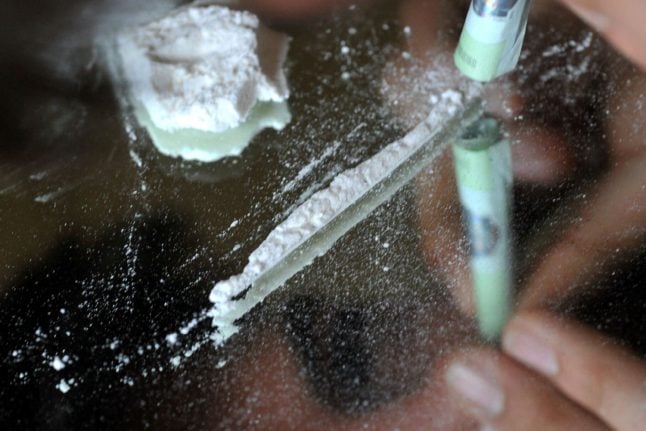According to local Berlin broadcaster RBB, police opened 35 new probes involving cocaine delivery between the months of May and October alone this year.
In 2018, there were 11 police investigations in connection with “cocaine taxis” in Berlin.
It has prompted concerns over increased usage of the class A drug – and how easy it is to get a hold of it in the capital.
Customers who want to buy cocaine order a “taxi” by making a phone call or sending a text with the address they want it delivered to. They are then connected to an unofficial call centre.
After 15 to 30 minutes (or longer if it’s the weekend), a dealer sends a text message to say they have arrived at the address.
The customer then usually gets into the car to hand over the money for the drug.
Drug dealers spread the word by handing out business cards in clubs.
More people using cocaine
Drugs are nothing new in Berlin, a city known for hedonism and nightclubs. But cocaine use is steadily on the rise.
A study into Berlin wastewater published by the European Monitoring Centre for Drugs and Drug Addiction found the amount of cocaine residues detected in Berlin almost doubled between 2014 and 2018.
Berlin is thought to be the German city with the second highest cocaine usage after Dortmund.
READ ALSO: Germany is Europe's drug capital, sewage system research reveals
Cocaine delivery services are one of the easiest ways for people to get their hands on the Class A drug. And the police are aware of that too.
Olaf Schremm, head of the department for Drug Crime at the State Criminal Investigation Office, said investigations into cocaine delivery has played a major role in their office over the past two to three years.
“Right now we have such a burden in our department with these cocaine delivery service investigations that it occupies the entire police department. This wasn't the case in previous years,” Schremm said.
He said officers struggle to keep track of the number of services out there.
“However, we know from investigation proceedings that such mobile phone numbers receive three-digit calls per day,” he added.
After heroin, cocaine is the second most frequent cause of death among consumers of illegal drugs in Berlin.
And the numbers are rising. According to police figures shown to RBB, 21 people died in Berlin after using cocaine in 2016. In 2018 there were 35 deaths and in the current year alone, up to July 25th, a total of 25 people have died in connection with using the drug.
READ ALSO: Record 4.5 tonnes of cocaine worth €1 billion seized in Hamburg
'It was like ordering pizza, it was normal'
Cocaine may be associated with party-goers but it can quickly take over people's lives and become addictive.
RBB talked to one businessman called Michael (whose name has been changed to protect his identity). He said initially he only used cocaine on weekends.
“It went well for a year, but after about 10 or 12 months I completely lost control,” he said. “Then I consumed cocaine every day.”
As many people around him also used cocaine to cope with their everyday lives, this behaviour seemed normal to Michael. He used to order the substance from three different “coke taxis”.
“It was like ordering pizza, it was normal,” he said. “It made me feel like it wasn't wrong.”
However, Michael's life spiralled out of control and he thought about the drug constantly.
His fiancée then arranged for him to attend an outpatient therapy centre in Charlottenburg. He has now been in therapy for several months and is turning his life around.
There have also been high profile cases of cocaine delivery in Berlin.
In May, police arrested two men for delivering cocaine by car. In one vehicle they found a kilogram of cocaine valued at €40,000, along with two firearms.



 Please whitelist us to continue reading.
Please whitelist us to continue reading.
Member comments